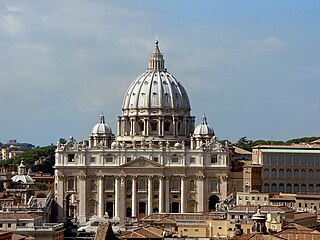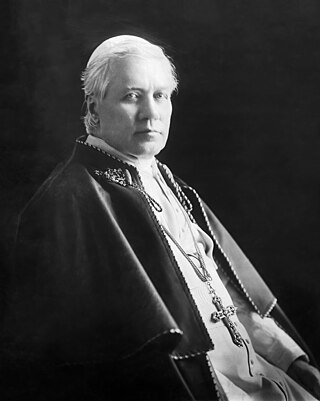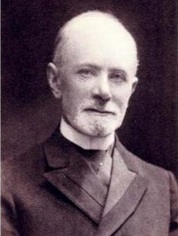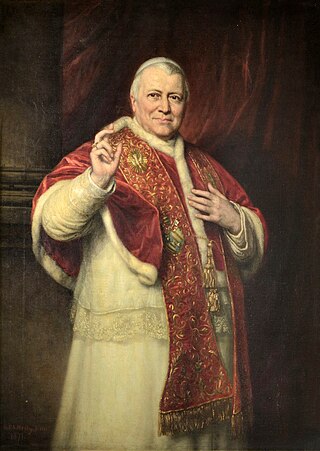
The Second Ecumenical Council of the Vatican, commonly known as the Second Vatican Council or Vatican II, was the 21st and most recent ecumenical council of the Catholic Church. The council met in Saint Peter's Basilica in Vatican City for four periods, each lasting between 8 and 12 weeks, in the autumn of each of the four years 1962 to 1965. Preparation for the council took three years, from the summer of 1959 to the autumn of 1962. The council was opened on 11 October 1962 by John XXIII, and was closed on 8 December 1965 by Paul VI.

Dei verbum, the Second Vatican Council's Dogmatic Constitution on Divine Revelation, was promulgated by Pope Paul VI on 18 November 1965, following approval by the assembled bishops by a vote of 2,344 to 6. It is one of the principal documents of the Second Vatican Council.
Dignitatis humanae is the Second Vatican Council's Declaration on Religious Freedom. In the context of the council's stated intention "to develop the doctrine of recent popes on the inviolable rights of the human person and the constitutional order of society", Dignitatis humanae spells out the church's support for the protection of religious liberty. It set the ground rules by which the church would relate to secular states.

Pope Pius X was head of the Catholic Church from 4 August 1903 to his death in August 1914. Pius X is known for vigorously opposing modernist interpretations of Catholic doctrine, and for promoting liturgical reforms and scholastic theology. He initiated the preparation of the 1917 Code of Canon Law, the first comprehensive and systemic work of its kind. He is venerated as a saint in the Catholic Church. The Society of Saint Pius X, a traditionalist Catholic fraternity, is named after him.

The Index Librorum Prohibitorum was a changing list of publications deemed heretical or contrary to morality by the Sacred Congregation of the Index ; Catholics were forbidden to print or read them, subject to the local bishop. Catholic states could enact laws to adapt or adopt the list and enforce it.
The Oath Against Modernism was instituted by Pope Pius X in his motu proprioSacrorum antistitum on September 1, 1910. The oath was required of "all clergy, pastors, confessors, preachers, religious superiors, and professors in philosophical-theological seminaries" of the Catholic Church. It remained in force until the Congregation for the Doctrine of the Faith, with the approval of Paul VI, replaced it with a revised Profession of Faith on July 17, 1967.

The Syllabus of Errors is the name given to a document issued by the Holy See under Pope Pius IX on 8 December 1864, as an appendix to his encyclical letter Quanta cura. It condemns a total of 80 propositions that the pope considered as errors or heresies.
Modernism in the Catholic Church describes attempts to reconcile Catholicism with modern culture, specifically an understanding of the Bible and Catholic tradition in light of the historical-critical method and new philosophical and political developments of the late 19th and early 20th centuries.

Alfred Firmin Loisy was a French Roman Catholic priest, professor and theologian generally credited as a founder of modernism in the Roman Catholic Church. He was a critic of traditional views of the interpretation of the Bible, and argued that biblical criticism could be helpful for a theological interpretation of the Bible.

Providentissimus Deus, "On the Study of Holy Scripture", was an encyclical letter issued by Pope Leo XIII on 18 November 1893. In it, he reviewed the history of Bible study from the time of the Church Fathers to the present, spoke against the errors of the Rationalists and "higher critics", and outlined principles of scripture study and guidelines for how scripture was to be taught in seminaries. He also addressed the issues of apparent contradictions between the Bible and physical science, or between one part of scripture and another, and how such apparent contradictions can be resolved.

George Tyrrell was an Anglo-Irish Catholic priest and a highly controversial theologian and scholar. A convert from Anglicanism, Tyrrell joined the Jesuit order in 1880. His attempts to adapt Catholic theology to modern culture and science made him a key figure in the debate over modernism in the Catholic Church beginning in the late 19th-century. During the anti-modernist crusade led by Pope Pius X, Tyrrell was expelled from the Jesuit Order in 1906 and excommunicated in 1908.
A syllabus or specification is a document that communicates information about an academic course or class and defines expectations and responsibilities. It is generally an overview or summary of the curriculum. A syllabus may be set out by an examination board or prepared by the tutor or instructor who teaches or controls the course. The word is also used more generally for an abstract or programme of knowledge, and is best known in this sense as referring to two catalogues published by the Catholic Church in 1864 and 1907 condemning certain doctrinal positions.
Pascendi Dominici gregis is a papal encyclical letter, subtitled "On the Doctrines of the Modernists", promulgated by Pope Pius X on 8 September 1907.

Neo-scholasticism is a revival and development of medieval scholasticism in Catholic theology and philosophy which began in the second half of the 19th century.
The International Theological Commission (ITC) is a body of the Roman Curia of the Catholic Church; it advises the magisterium of the church, particularly the Dicastery for the Doctrine of the Faith (DDF), a dicastery of the Roman Curia. Its memberships consists of no more than 30 Catholic theologians appointed by the pope at the suggestion of the prefect of the DDF for renewable five year terms. They tend to meet annually for a week in Rome, where the commission is based.

Romano Amerio was a Swiss-Italian theologian and a late critic of post-Conciliar evolutions in liturgy and ecclesiology. His magnum opus is Iota Unum. It is a work dedicated to the study of the ruptures in Church teaching and tradition following the Second Vatican Council.

Papal infallibility is a dogma of the Catholic Church which states that, in virtue of the promise of Jesus to Peter, the Pope when he speaks ex cathedra is preserved from the possibility of error on doctrine "initially given to the apostolic Church and handed down in Scripture and tradition". It does not mean that the pope cannot sin or otherwise err in some capacity, though he is prevented by the assistance of the Holy Spirit from issuing heretical teaching even in his non-infallible Magisterium, as a corollary of indefectibility. This doctrine, defined dogmatically at the First Vatican Council of 1869–1870 in the document Pastor aeternus, is claimed to have existed in medieval theology and to have been the majority opinion at the time of the Counter-Reformation.

École biblique et archéologique française de Jérusalem, commonly known as École Biblique, is a French academic establishment in Jerusalem specializing in archaeology and Biblical exegesis.
The modern history of the papacy is shaped by the two largest dispossessions of papal property in its history, stemming from the French Revolution and its spread to Europe, including Italy.
Syllabus most commonly refers to an outline and summary of topics to be covered in an education or training course.











